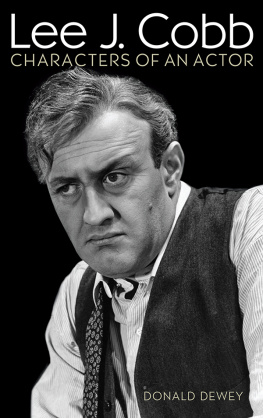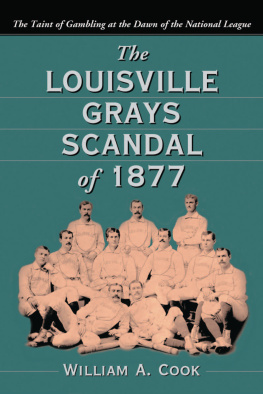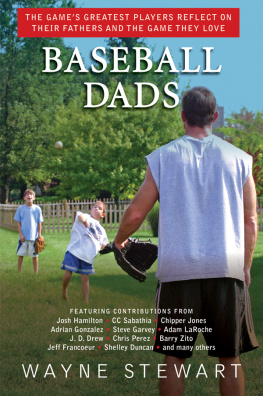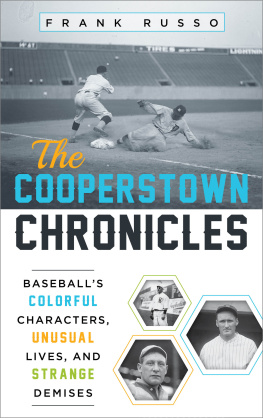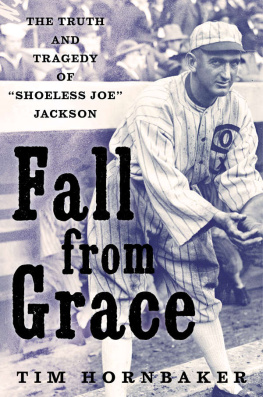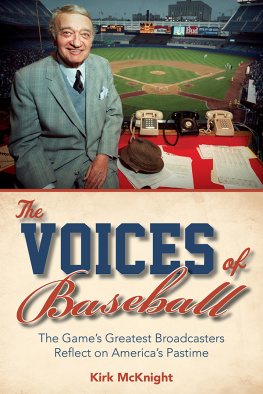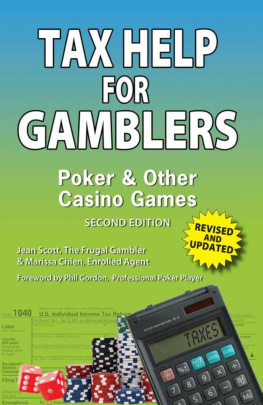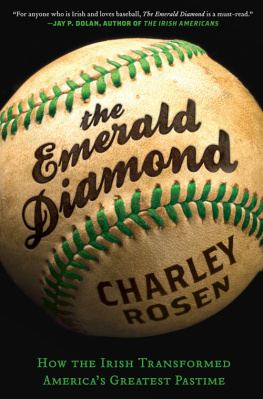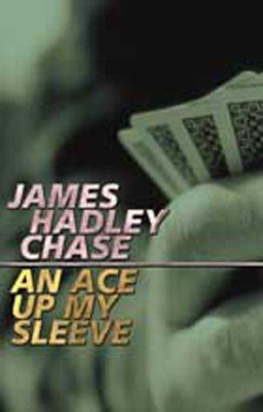


2004 by Donald Dewey and Nicholas Acocella
All rights reserved
First Nebraska paperback printing: 2016
Library of Congress Cataloging-in-Publication Data
Names: Dewey, Donald, 1940 | Acocella, Nick.
Title:The black prince of baseball: Hal Chase and
the mythology of the game / Donald Dewey and
Nicholas Acocella.
Description: Lincoln: University of Nebraska Press,
[2016] | 2004. | Includes bibliographical references
and index.
Identifiers: LCCN 2015039998
ISBN 9780803299399 (paper: alk. paper)
ISBN 9780803299665 (epub)
ISBN 9780803299672 (mobi)
Subjects: LCSH : Chase, Hal, 18831947. | Baseball
playersUnited StatesBiography. | Baseball
BettingUnited StatesHistory.
Classification: LCC C.V 865.c434 D49 2016 | DDC
796.357092dc23 LC record available at
http://lccn.loc.gov/2015039998
The publisher does not have any control over and does not assume any responsibility for author or third-party websites or their content .
For: Dick Litell and Caroline Acocella
Acknowledgments
This book would not have been possible without the assistance of scores of people. To start with, we want to thank Hal Chases grandchildren Barbara Chase, Jeff Chase, John Chase, Jud May Chase, Pat Chase, and, especially, Hal (Casey) Chasefor sharing with us what they knew of their grandfather and for helping us to gain access to several legal documents. We are likewise indebted to grandnephew Frank Cloak, who provided invaluable details about the Williams, California, years.
Ellen Pangarliotas was extremely gracious about sharing memories about her grandaunt, Chases second wife, Anna Cherurg. Her nephew Matthew Scelza provided what was perhaps the most significant document we came acrossthe 1920 contract proving that John McGraw lied under oath about the circumstances of Chases departure from the Giants.
Next are those who knew Chase or family members in Williams and Colusa. We thank them not only for their stories but also for their insights into the dynamics behind all the stories. Among those we spoke with from the towns were Virginia Boggs, Helen Ash Harbison, Larry and Charlene LaGrande, Matt LaGrande. Vic LaGrande, Barbara Messick, Tom Nicoletti, Bernice Paradise, George Rollins, and Dr. David Smith. But if there was a single most valuable player for researching this period in Chases life, it was Barbara Ash of the Colusa County Historical Society, who directed us to the right people in and out of California and who was able to track down the most obscure particulars.
A small army of librarians, archivists, museum curators, and reporters from various parts of the United States and Canada looked up articles and addresses with incredible patience and resolute deafness to the panic in our voices. Lets hope we dont forget any here: Harry Ames, Douglas Historical Society; Laura Bajuk, executive director, Los Gatos Museum Association; Jeffrey Brown, Maine State Archives; Mary Coon, reference librarian, Albany Public Library; Pat Dunning, Los Gatos Museum Association; Donna Fogarty, Windsor (Vermont) Public Library; Kim Frontz, Arizona Historical Society; Sandra Gates, Kansas City (Missouri) Public Library; Glenna Harold, University of Cincinnati Law Library; Wayne Huddleston, Union Pacific Railroad Company; Bob Johnson, California Room, Dr. Martin Luther King Jr. Main Library, San Jose; Linda Kennedy, Buffalo and Erie County Historical Society; Karen Lago, Russell P. Flower Library, Watertown, New York; Don Langlois, Arizona State Library; Larry Lee, Mesa Public Library; Brandon McClintock, Woodland (California) Public Library; Ann McMahon, Santa Clara University; Linda Meiss, California Room, Dr. Martin Luther King Jr. Main Library, San Jose; Archie Motley, Chicago Historical Society; Linda Osier, Ogdensburg (New York) Public Library; Brother Dan Peterson, Jesuit Archives, Los (Jatos; Karen Ramos, StocktonSan Joaquin County Public Library; Deborah Scheffler, Free Library, Geneva, New York; Melissa Scroggins, California History Museum, Fresno Public Library; Rosemary Scullin, Oswego (New York) Public Library; William Sturm, Oakland History Room, Oakland Public Library; Caroline Swift, Santa Cruz Sentinel ; Rosemary Szezygiel, Arizona State Library; Julie Thomas, Chicago Historical Society; Llovd Ultan, Bronx historian; Catherine Watson, Toronto Public Library.
One of the earliest research bounties came from Linda Wobbe and Sue Birkenseer at the St. Marys College library; they pulled out boxes of old scrapbooks compiled by a long-deceased Christian brother and wondered why no one had asked about them for years. In the same vein of the Dusty and the Neglected were the land records tracing the history of the Topham property in Williams; doing the dragging out here were the Colusa County clerk and recorder Kathleen Moran and her assistant Linda Rakela.
Lets not forget the baseball people. Bill Francis, the National Baseball Hall of Fame and Museums crack researcher, provided us with dozens of files. The curator of the Hall of Fame, William T. Spencer, was generous in his efforts to help us clarify the mysterious disappearance of the Harry Grabiner diaries, as were Grabiners daughter June Travis Friedlob, Fred Krehbiel, and Mike Veeck. Jack Lang was essential for working through another curious disappearancethe votes originally given to Chase for Hall of Fame membership but later expunged from the records of the Baseball Writers Association of America. John Spalding and Bill Weiss clarified some points on the history of California baseball, Terrence Cole enlightened us about indoor baseball, and Ernie Harwell was instructive about the New York Giants.
We received critical assistanceincluding private tapes and unpublished manuscriptsfrom various members of the Society of American Baseball Research ( SABR ) and from relatives of one-time Major League players, especially those with the Cincinnati Reds teams in the late 1910s.
Thanks go to Carlos Bauer, Richard Beverage, Bob Edelman, Gary Fink, Edward Kopf, R.J. Lesch, Barbara Meyer, Anne Rixey, Eppa Rixey, Eric Sallee, Paul Sallee, Jim Sandoval, Joe Santry, and Fred Schuld. Without Eddie Ryerson we might still be looking to contact the gracious nieces of Christy Mathewson, Betty Mathewson Phillips and Grace Mathewson Van Lengen.
Another source directly from baseball was Gib Bodet, the longtime Dodgers superscout who shared with us his lifelong fascination with Chase, his own unpublished memoir on the first baseman, and his general knowledge of the game. We couldnt have done without any of it.
Lynn Bevills thesis on the Copper League was the starting point for our research on the Princes years in Arizona. Lynns contributions didnt end there. He also provided us with letters from people who knew Chase and pointed us toward the S. L. A. Marshall papers at the University of Texas and the revelations about Chases bizarre relationship with Aimee Semple McPherson.
And Bevills felicitous hunch about the whereabouts of Marshalls papers would have been just another dead end had Thomas Burdett, curator of the S. L. A. Marshall collection at the University of Texas, El Paso, not dug out with incredible dispatch the original unedited manuscript of Marshalls autobiography.
Attorneys Frank Capece and Judi McDermott prepared the papers enabling us to gain access to the record of Chases divorce from Nellie Heffernan. Since New York State seals divorce files for one hundred years, this took time, effort, and perseverance, and we are grateful.
Next page

